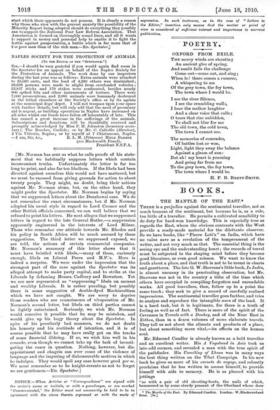[Mr. Norman has sent us what he calls proofs of
his state- ment that we habitually suppress letters which contain inconvenient truths. Unfortunately the letter is far too long to print, and also far too libelous. If the libels had been directed against ourselves this would not have mattered, but we must be excused from giving grounds for action to about twenty people. They might, no doubt, bring their actions against Mr. Norman alone, but, on the other hand, they might prefer the Spectator. Mr. Norman begins by saying that we suppressed letters about the Denshawai case. We do not remember the exact circumstances, but if Mr. Norman adopted his usual style in regard to Lord Cromer and the other British officials concerned, we can well believe that we refused to print his letters. He next alleges that we suppressed letters in regard to the late General Butler,—a suppression apparently engineered in the interests of Lord Milner. Those who remember our attitude towards Mr. Rhodes and his policy in South Africa will be much amused by these suggestions. The third letter we suppressed exposed, we are told, the actions of certain commercial companies. Mr. Norman's summary of this letter shows that it must have bristled with libels,—many of them, curiously enough, libels on Liberal Peers and M.P.'s. Here is indeed a surprise. We were under the impression that the strongest part of the case against the Spectator was its alleged attempt to make party capital, and to strike at the Liberals by defaming Messrs. Cadbury and B,owntree. Yet we are now represented as "suppressing" libels on earnest and wealthy Liberals. It is rather puzzling, but possibly there is some suggestion of double-dyed Machiavellism which we have not caught. We are sorry to deprive those readers who are connoisseurs of vituperation of Mr. Norman's second letter, but libels on third parties cannot be lightly entertained. Seriously, we wish Mr. Norman would conceive it possible that he may be mistaken, and would give up his bogy theory about the Spectator. In spite of his peculiarly bad manners, we do not doubt his honesty and his rectitude of intention, and it is of course possible that he may have really got on the tracks of some financial illdoing. If so, we wish him well in his crusade, even though we cannot take np the task of investi- gating the cases in question. Nothing, however, but dis- appointment and chagrin can ever come of the violence of language and the imputing of dishonourable motives in which he indulges. They would spoil any case however good per se. We must remember so to be knight-errants as not to forget we are gentlemen.—En. Spectator.]










































 Previous page
Previous page